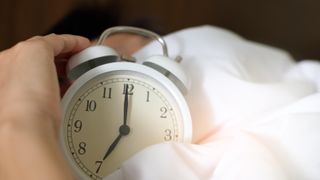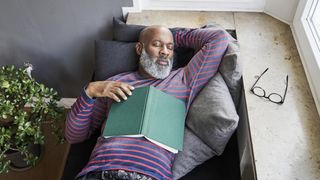How to fix your sleep schedule: a sleep expert guides you through it
Dr Lindsay Browning reveals how to fix your sleep schedule and reset your body clock

For the best quality sleep, you want to be going to bed and waking up at the same times every day. However, there are plenty of things that can throw things off and lead to a sleep routine that's all out of whack. Most likely, life has just got in the way, but there are also factors like jet lag from travel and Daylight Saving Time changes that cause disruptions to bedtimes. Maybe its revenge bedtime procrastination causing the problem. We're not here to judge.
Whatever the reason for your wonky sleep habits, if you’re wondering how to fix your sleep schedule fast, there’s good news: you can retrain your body to go to bed earlier and wake up earlier, but you might need some expert help to get there.
Dr Lindsay Browning is a chartered psychologist and neuroscientist. Here Dr Browning dishes out her expert tips on how to reset your sleep schedule, how to figure out your best bedtime, and how much sleep you need.
Remember, what you sleep on can also make a difference to how well you rest, so if your bed has seen better days, take a look at our best mattress guide. Or, if you think it has a little longer left in it, try our best mattress toppers guide instead.

How to fix your sleep schedule, starting tonight
If your sleep schedule is so out of whack with where you need it to be that you’re going to bed when the sun is rising and you’re sleeping through until the afternoon – and it isn’t because you’re a shift worker – speak to a doctor or sleep expert. Why? Because they may need to create a more tailored reset for you, which could see you moving your sleep schedule forwards a whole day over a set period of time instead of backwards.
“When we’re anxious we breathe from the top of our chest and it’s shallow and fast, which makes our brain think there’s something wrong. So if you slow your breathing, you’re acting as you would when you’re calm. That makes your brain think you’re fine. I recommend ‘4, 7, 8 breathing’ to my clients. To do this, breathe in through your nose for a count of 4, hold that breath for a count of 7, then breathe out through your mouth – like you’re blowing up a balloon – for a count of 8. Do that four to eight times in a row.”
But if you’re going to bed at 1am and you want to start going to bed at 11pm, for example, then you’re in good hands here. “Think of fixing your sleep schedule a bit like being jet-lagged,” Dr Browning begins, “because basically you are in a different time zone to the one you want to be in.”
“Yes you can fix this straight off and get up two hours earlier than you are right now, but that will be harder initially than if you were to fix your sleep schedule over several days. Shifting your sleep by 20 minutes a day is easily doable and has no negative effects whatsoever.”
Sign up to get the BEST of Tom's Guide direct to your inbox.
Here at Tom’s Guide our expert editors are committed to bringing you the best news, reviews and guides to help you stay informed and ahead of the curve!
Using this method, you could reset your sleep schedule by an entire hour in just one weekend. Simply make your bedtime 20 minutes earlier tonight, and get up 20 minutes earlier again tomorrow. The following night, make it 20 minutes earlier again. For example:
- Night 1 – Go to bed at 11.40pm
- Night 2 – Go to bed at 11.20pm
- Night 3 – Go to bed at 11pm
“Don’t forget that if you’re moving your bedtime back by 20 minutes a night, you need to move your wake time forward by 20 minutes a day. And it’s really important to get up straight away because if you let yourself sleep in, all of this work is pointless. Pressing the snooze button several times is one of the worst things you can do for your sleep.”
Keep going with this approach until you reach your goal bedtime based on when you need to wake up AND how much sleep you need. Unsure how many hours you should be getting each night? Let’s find out…


Dr Lindsay Browning is a chartered psychologist, neuroscientist, and sleep expert at Trouble Sleeping. A member of the British Sleep Society and the American Academy of Sleep Medicine, she has published several academic papers and an international self-help book: Navigating Sleeplessness.
How to figure out your best time to sleep and wake
“Most adults need between seven and nine hours’ sleep a night, but that doesn’t mean every person needs that much sleep.” Dr Browning explains. “The easy way to figure out how much sleep you need is to pay attention to how you feel when you wake up. Basically, how much sleep do you need in order to wake up feeling refreshed and able to function well?
Techniques such as the Military Sleep Method and body scan meditation technique are designed to help you drop off quickly. If you find you're lying in bed for 20 minutes or longer and you're still awake, consider implementing the 15 minute sleep rule, and getting up to do something relaxing in another room until you feel sleepy.
“If you’re getting 7.5 hours’ sleep but you’re still feeling tired, then even though 7.5 hours’ might be within the general sleep guidelines for adults, that might not be enough sleep for you.” The amount of sleep you need can also vary by age.
By the way, it’s a myth that if you can’t fall asleep instantly you have a problem. It’s normal to take a little while to drop off, which is why Dr Browning recommends to her clients that they add on around 30 minutes of falling asleep time. "You’ll probably wake up in the night too, so adding on that extra time will enable you to get the actual amount of sleep you need without anything else eating into it."
Let’s figure out some bedtimes now, based on 7.5 to 9 hours’ sleep and various wake-up times, factoring in 30 minutes to fall asleep:
| Wake-up time: | Bedtime for 7.5 hours of sleep (plus 30 minutes): | Bedtime for 9 hours of sleep (plus 30 minutes): |
| 6am | 10pm | 8.30pm |
| 6.30am | 10.30pm | 9pm |
| 7am | 11pm | 9.30pm |
| 7.30am | 11.30pm | 10pm |
| 8am | 12 midnight | 10.30pm |
| 8.30am | 12.30am | 11pm |
| 9am | 1am | 11.30pm |
How your chronotype affects your sleep schedule
Ever heard the phrases ‘night owl’ or ‘lark’ in relation to a person’s sleep? Those are chronotypes and they refer to when your body is naturally inclined to sleep (related to the idea of sleep windows. “The most well known chronotypes are owls and larks. Owls tend to want to stay up late and wake up later, while larks want to go to bed early and get up early.” Dr Browning explains.
“There are loads of people in the middle. If you have a job that requires you to get up at 7am, regardless of whether you’re a lark or an owl, you have to get up at 7am. So the trick is how best to manage it during the day.”

How to manage if you’re an owl type
“Owl types need to set bedtime reminders, because otherwise they’ll keep going and then before they know it, it’s 2am and they have to be up at 7am for work. All that happens there is the owl misses out on sleep. On weekends, resist the temptation to go to bed late and wake up late because that’s going to shift your body clock again."
You also need to think about when you're eating, because if you skip breakfast and don’t eat until around 11am, your body won’t think it’s morning until 11am. "Even if you can’t face eating a full breakfast upon waking up, have something small to wake up your digestive system. Otherwise you’ll be sleepwalking through the morning.
“Owls aren’t at their best first thing, so it’s more important for them to get really good sun exposure first thing to help boost them into feeling more awake."
"This is helpful because bright light suppresses melatonin production. Melatonin of course helps us sleep. Take a relaxing bath with lavender oil too – there have been a few studies that show the smell of lavender is helpful for sleep. The bath warms you up and then when you get out you cool down. That cooling effect helps you feel sleepy."
Here's a tip for how to structure your working day to better suit your chronotype: “If you’re an owl type, try not to schedule anything difficult in the morning because you won’t be at your best. Save those tasks for later in the day when you’re feeling more alert.”
How to manage if you’re a lark type
“Resist the temptation to go to bed early otherwise you’re going to wake up very early. Yes you will have had enough sleep, but you may also think you have a sleep problem because you’re awake so early." Dr Browning tell us. "Try to stay up until your bedtime because that will help you sleep through until your actual wake up time."
When it comes to work, you can do the complete opposite to owl types. “If you’re a lark, you’ll naturally be more alert early in the morning, so tackle your biggest, most difficult projects then. “Leave the mundane, more mindless tasks until later in the day when you aren’t so energetic."
Lastly, if you’re a lark who likes to nap, don’t nap late in the afternoon as this could disrupt your night’s sleep.

How to fix your sleep schedule when ditching naps
Speaking of naps, some of us have been squeezing a delicious daytime nap into our lunch breaks, which isn’t so easy to do in an office. For those who find themselves in a place where daytime napping is no longer viable, Dr Browning suggests extending your night’s sleep to make up for lost zzz’s.
“If you can pop out to your car or into an empty meeting room for a 20-minute post-lunch nap, then by all means do so. In fact, I would highly recommend it as research shows that naps are beneficial for us. But if you can’t, it’s important to reassess how much sleep you’re getting at night.”
“Pick out your outfit, prepare your lunch and write your to-do list. That way, you won’t be lying in bed worrying as everything will be taken care of. This could be part of your wind-down routine. This is important because if you’re stressed or rushing around trying to get things ready for work the next day, your brain is still ‘on’ and you won’t feel sleepy.”
Basically, if you’re faced with having to ditch your 20-minute nap, add 20 minutes onto your sleep at night otherwise you’ll just feel tired. “I advise my clients not to nap after around 2pm. That means if you’re napping at 4pm or 5pm, you could potentially disrupt your night’s sleep because it will be harder for you to fall asleep."
How long should you nap for? "20 minutes is perfect and just enough to help you feel refreshed, or you could nap for 90 minutes [a full sleep cycle] if you have a very understanding boss. There’s nothing wrong with an hour’s nap either, but you will be waking up in a deeper sleep so you’ll experience that sleep inertia and feel a lot more groggy."

Claire is a fully qualified journalist and Certified Sleep Science Coach with over 15 years’ product review experience. Claire is responsible for all mattress and sleep content published on Tom’s Guide, including our Best Mattress of 2024 buying guide. She is our expert on Saatva, DreamCloud, Nectar and Tempur-Pedic mattresses, and is also our in-house hybrid mattress specialist. Claire is certified to advise people on how to choose a mattress that best suits their sleep, body and budget, as well as helping them to create a nighttime routine and bedroom environment that promote good sleep. As Senior Sleep Editor, Claire takes the lead on developing and overseeing rigorous testing procedures for our mattress reviews, both at home and in our fully equipped Sleep Studio. Claire leads a team of experienced sleep and mattress specialists who report on and test a wide range of mattress and sleep products, and she also writes about all things related to sleep, and has interviewed a wealth of experts including mattress designers and buyers, neuroscientists, and doctors of sleep medicine.
Most Popular
